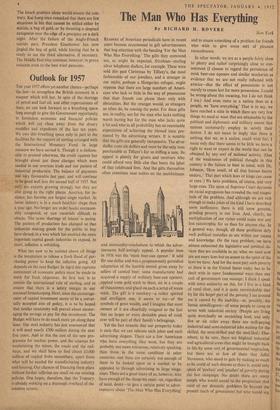Outlook for 1957
THE year 1957 offers yet another chance—perhaps the last—to strengthen the British economy in a manner which will last. In spite of the shortage of petrol and fuel oil, and other repercussions of Suez, we can look forward to a breathin4 space long enough to give the Government opportunity to formulate economic and financial policies which will cut clean away from the dreary muddles and expedients of the last ten years. We owe this breathing space only in part to the facilities for the support of sterling arranged with the International Monetary Fund. In large measure we have earned it. Though it is fashion- able to pretend otherwise, the credit squeeze has brought about just those changes which were needed in our overseas trade and our pattern of industrial production. The balance of payments was very favourable last year, and will continue to be good well into the second half of 1957. Not only are exports growing strongly but they are also going to the right places. America, for in- stance, has become our largest single market. At home industry is in a much healthier shape than a year ago. No longer arc order books unreason- ably congested, or raw materials difficult to obtain. The acute shortage of labour is easing. The pattern of production has changed so that industries making goods for the public to buy have shrunk in a way which has enabled the more important capital goods industries to expand. In short, inflation is subsiding.
What has now to be resisted above all things is the temptation to release a fresh flood of pur- chasing power to keep the inflation going. All depends on the next Budget. In April this supreme instrument of economic policy must be made to work for fresh objectives. Its first task is to sustain the international role of sterling, and to ensure that there is a safety margin in our national housekeeping. Next, since the encourage- ment of capital investment seems to be a univer- sally accepted aim of policy, it is to be hoped that, similar unanimity will prevail about encour- aging the savings to pay for this investment. The Budget will have to do much more yet along these lines. The steel industry has just announced that it will need nearly £700 million during the next five years. Acid to this the cost of the new pro- gramme for nuclear power, and the schemes for modernising the mines, the roads and the rail- ways, and we shall have to find about £3,000 million of capital from somewhere, apart from what will be needed for manufacturing industry and housing, Our chances of financing these plans without further inflation arc small on our existing policies. One hopes, therefore, that the Treasury is already working on .a thorough overhaul of the taxation system.














































 Previous page
Previous page